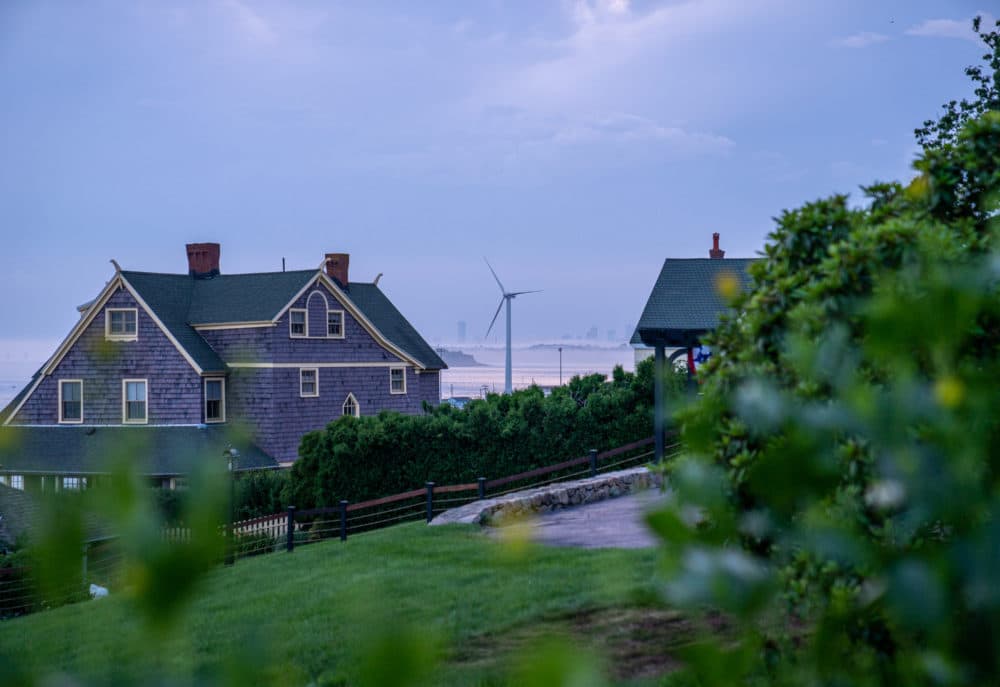Advertisement
Commentary
If you care about the planet but resist solutions for selfish reasons, you might be a NIMBY

Earlier this month, the Intergovernmental Panel on Climate Change issued its 2,178,349th warning that the time bomb of climate change is nearing detonation. OK, I made up the number, but not the fact that we've had years of such alarms to little avail. Climate change deniers bear obvious blame, as do skeptics who, with Putin-esque diversion, mouth a misleading mantra: The two cheapest renewable-energy sources are unreliable, as wind doesn’t always blow, nor sun always shine.
But reliably regular hot air gusts from the windbags called NIMBYs–Not In My BackYard types who would sabotage the Earth to keep the view out their window pristine, free of wind turbines and solar panels. The most hypocritical of the species inhabit progressive bastions like my state of Massachusetts.
Last month, the Amherst town council came heart-stoppingly close to enacting a moratorium on large, ground-based solar projects. Moratorium backers claimed Amherst needed to write solar regulations first. “Smart, sensible approaches to solar siting don’t depend on moratoriums,” responded Councilor Mandi Jo Hanneke, making her a solon among a depressing number of residents and councilors who preferred the dumb, insensible approach.
Offshore wind power in particular has navigated choppy waters in the Bay State. On the plus side, construction commenced last fall on a wind farm 15 miles off Martha’s Vineyard that could cut greenhouse emissions equivalent to 325,000 fewer cars a year. But another project fell before fire from wealthy Cape Cod-ers (the names Kennedy and Koch perhaps ring a bell).
The most hypocritical of the species inhabit progressive bastions like my state of Massachusetts.
This halting progress also hobbles Vermont, home to Bernie Sanders, the continental U.S.’s first billboard ban and a once impressive commitment to wind power. Sadly, “environmentalists” have stalled Vermont wind projects of late. Their excuses rival Republicans’ babble at Ketanji Brown Jackson’s hearing: Turbines are unbearably loud (though a reporter checking out one wind farm couldn’t hear them) and destroy farmland (though Vermonters farming the land barely outnumber dodo birds).
"I love Vermont dearly and admire its conservation ethic," renowned environmentalist and Middlebury resident Bill McKibben told the Sierra Club. "But there are moments, faced with a global crisis, when it feels like the state motto should be 'Don't change a thing until I die.' ”
NIMBYism doesn’t confine itself to blue states. In 2019, following a decade-plus battle, Ohioans in a fetal curl over a proposed wind farm finally lanced the project. Their weapon, oiled in irony, was environmental law privileging preservation of an endangered bat, five of which might have been diced by turbine blades annually.
Warming temperatures kill bats and other species elsewhere, in addition to the other planetary plights they impose. But hey, Buckeyes won’t suffer the noise that apparently deafens Vermonters.
While NIMBYs get cover from the alleged unreliability of wind and solar, the IPCC authors dismiss that distraction from immediate, effective measures to save the planet (and, incidentally, to spare consumers surging gas prices that “look like the frequencies of AM radio stations”).
Start where whiners fear to tread, with personal responsibility. Americans aghast at soaring energy bills could insulate themselves with steps that wise heads futilely suggested during the last such hike a decade ago: switching to smaller, fuel-efficient or electric cars, taking mass transit and walking more, and losing their jones for unnecessarily large, AC-and-heat-hungry homes.
Advertisement
Collectively, Washington could begin phasing out our $600-plus billion boondoggle of fossil fuel subsidies. Masking fossil fuels’ true market cost, these handouts, and other nations,’ contribute more to climate change (perhaps 10% of global emissions) than clean energy’s supposed fecklessness. It shouldn’t be an impossible ask that taxpayers aren’t dunned for poisoning the atmosphere.
The government also should ignore naysaying about the limits of wind and solar. The IPCC authors note the expert consensus that, “for the coming decade, rapidly reducing coal electricity and building extensive wind, solar and storage systems are low-cost strategies in many places, regardless of how much energy might or might not eventually come from renewables.
“This is because plummeting costs make solar and wind increasingly competitive, and electricity from solar is now the ‘cheapest source of electricity in history’ in some locations. … Moreover, the costs of batteries and other storage technologies are also declining.”
We still need longer-term solutions, among them nuclear power, the only low-carbon energy that’s currently scalable.
The authors acknowledge renewables must be married to the aforementioned behavior changes and energy efficiency — and that’s where companies and states, nimbler than the feds, come in, with policies like more energy-efficient buildings and remote work that takes cars off roads.
Massachusetts could atone for NIMBYism by ordering more vigorous environmental vetting of a proposed natural gas plant in Peabody. Intended as backup power when demand peaks, the plant’s estimated emissions would equate to 1,300 additional cars on the road. The IPCC report calls for a cease-and-desist on all new fossil fuel infrastructure. And a 2015 study deemed fears that the power will go off in New England without new gas pipelines as, well, hot air.
We still need longer-term solutions, among them nuclear power, the only low-carbon energy that’s currently scalable. Siting a few nukes in NIMBYs’ backyards might persuade even fission-fearing greens. Even they would enjoy the schadenfreude from triggering hypocrites.
